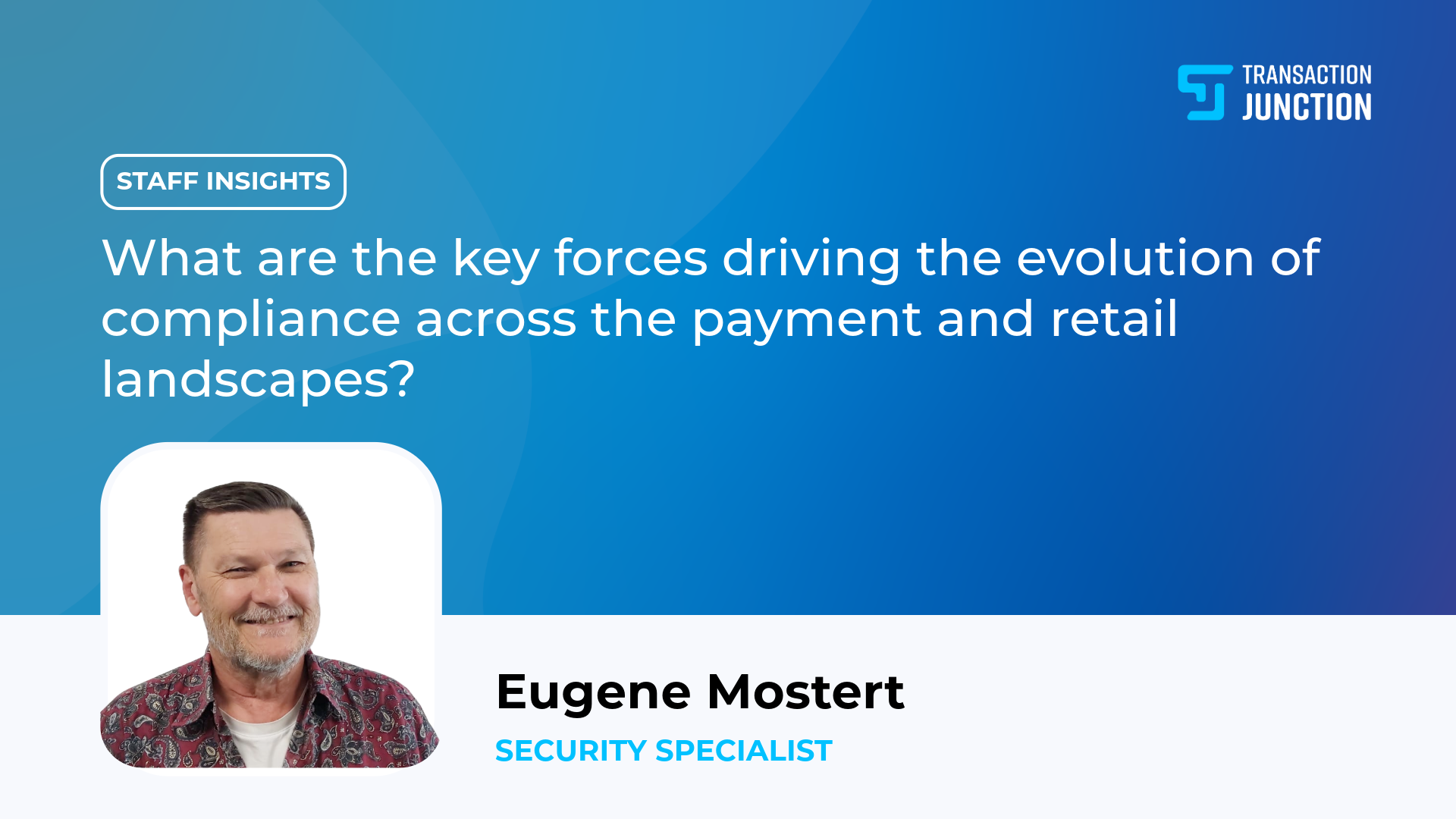Eugene Mostert, Security Specialist employed at Transaction Junction for approximately 18 years, shares his insights on the evolution of compliance across the payment and retail landscapes.

Payments compliance and regulation have evolved significantly in response to the rapid transformation of the financial and retail sectors, driven by technological advancements, increased cybersecurity threats, and the need for consumer protection. Here’s a look at why these regulations have changed and how they’ve developed over time:
1. Rise in Digital and Online Transactions
- Why: As e-commerce and digital payments have grown, so have associated risks, such as fraud and cyberattacks. The increase in remote transactions means that sensitive data (e.g., credit card numbers, personal details) is constantly at risk of interception.
- How: Regulations such as the Payment Card Industry Data Security Standard (PCI DSS) were introduced to ensure businesses protect cardholder data. PCI DSS mandates standards for storing, processing, and transmitting payment data securely.
2. Cybersecurity Threats and Data Breaches
- Why: High-profile data breaches in retail and financial sectors exposed millions of customer records, prompting regulatory bodies to introduce stricter security requirements. Retailers, as major holders of personal and financial data, became prime targets.
- How: Regulations now require companies to implement strong encryption, network security measures, and access controls. POPI and PAIA mandate that organisations handling personal data employ strict security protocols and give customers more control over their data. PCI DSS and other payment standards also demand regular audits and vulnerability assessments to keep systems secure.
3. Innovation and the Rise of Fintech
- Why: The emergence of fintech companies offering alternative payment solutions disrupted traditional banking and brought innovations like peer-to-peer payments, digital wallets, point-to point encryption payments, and crypto currency.
- How: To create a level playing field, FICA implemented the following regulations Anti-Money Laundering (AML) and Know Your Customer (KYC) which were extended to fintech firms, requiring them to verify users’ identities and monitor transactions to prevent illicit activities.
4. Consumer Protection and Fraud Prevention
- Why: Increasing consumer awareness of data privacy and security concerns pushed regulators to develop rules that safeguard customer data and prevent unauthorised transactions.
- How: POPI and PAIA, which mandates how to ensure that only authorised users can access payment accounts. Additionally, PCI DSS requires retailers to keep cardholder data secure and outlines strict policies on how data should be stored, processed, and transmitted.
5. Globalisation of Payment Systems
- Why: With the globalisation of commerce, payments are now frequently processed across borders, involving multiple financial entities. This increases complexity and risk.
- How: Regulators have developed standards that align globally to facilitate secure cross-border payments. ISO 20022, a global standard for electronic data interchange between financial institutions, is becoming widely adopted for real-time payments across countries, helping to standardise and streamline international transactions.
6. Emergence of Cryptocurrencies and Digital Assets
- Why: The rise of digital assets like cryptocurrencies introduced new challenges for regulators, especially around issues of fraud, money laundering, and lack of consumer protection.
- How: Regulators have started to develop frameworks to govern digital assets. For example, the Financial Intelligence Centre (FICA) was established to help fight financial crimes like money laundering, terrorist financing, and tax evasion. It also aims to protect banking customers from these crimes.
Key Regulations and Frameworks Driving Compliance in Payments
- PCI DSS (Payment Card Industry Data Security Standard): Sets requirements for secure cardholder data handling for all entities involved in payment card processing.
- AML and KYC Regulations: Enforce identity verification, transaction monitoring, and anti-money laundering measures for payment providers.
- POPI: The Protection of Personal Information Act is a piece of legislation which governs the law of data protection and privacy in South Africa.
- PAIA: The Promotion of Access to Information Act, 2000 is a freedom of information law in South Africa. It gives the constitutional right of access to any information held by the State and any information held by private bodies that is required for the exercise and protection of any rights.
- FICA: South Africa’s financial intelligence unit, mandated to assist in identifying the proceeds of crime, and in combating money laundering, terrorist financing and the financing of proliferation of weapons of mass destruction, thereby helping to make South Africa’s financial system intolerant to abuse.
Impact of Compliance and Regulatory Evolution
- Enhanced Security and Fraud Prevention: As compliance regulations have strengthened, they’ve helped reduce fraud by enforcing secure payment protocols.
- Increased Costs for Businesses: While necessary, compliance can be expensive and complex, particularly for smaller businesses.
- Greater Consumer Confidence: By implementing security measures and providing control over personal data, regulations help increase consumer trust in digital payment systems.

